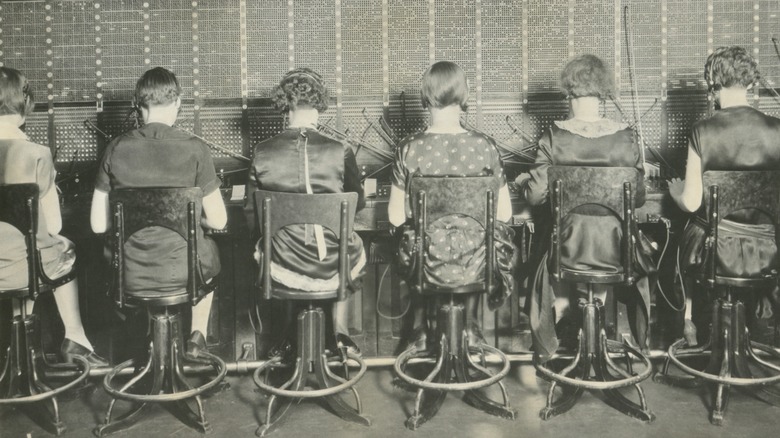Whatever Happened To Telephone Operators?
Although history remembers telephone operators as women, the first operators were actually teenage boys (via the Telecommunications History Group). This is all thanks to George Coy. Coy had witnessed Alexander Graham Bell demonstrate his new invention, the telephone, in 1877 (per History). Inspired by Bell, he would set up the first telephone exchange in the U.S. shortly after. Coy's male employees, however, would not last, as they "engaged in horseplay and foul language". Per A Better Answer, they were quickly replaced by young girls who were "gracious" and well mannered.
As early phones had no dials or keys, AP News reports that telephone operators were considered to be the voice of the community. A telephone owner would call the exchange and the operator would answer. Their voices would become a familiar sound, resulting in "intimacy between client and customer." They would then connect calls by inserting a plug into the proper socket. Though it sounds simple, the job was rigorous by all accounts.
The pay was dismal and the hours were incredibly long. According to the Engineering and Technology History Wiki many ended up having to do technical troubleshooting. Subjected to strict rules, including a dress code and a code of ethics, some were punished for even giggling. As technology progressed, however, the need for telephone operators began to diminish.
Technology and the fall of telephone operators
According to History, the number of telephone operators began to decline in the 1930s. The Engineering and Technology History Wiki reports that this is due to "automatic switching equipment." Operators could not handle the amount of calls coming in as telephones became more common in American homes. Thus, AT&T began to install automatic switches. In addition, more and more people were buying phones that had a dial, which further eliminated the need for telephone operators. While thousands of women lost their jobs, telephone operators were still needed for long distance and collect calls. Per AP News this included doing the billing for those calls.
By 1940, the number of telephone operators had dropped to 200,000. AT&T was later blamed for creating "technological unemployment." Nonetheless, the role of a telephone operator is remembered for its importance in the early 20th century. One former operator told NPR that the job was a "good option if you didn't have a college degree." Moreover, they "handled all kinds of requests," and provided the weather, news, and more. As of 2021, only 5,000 workers were listed as telephone operators. This number is expected to decline by 2029.

